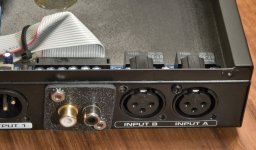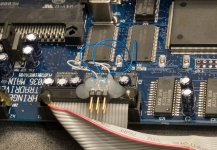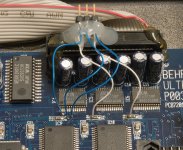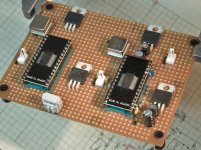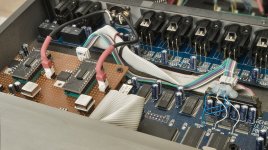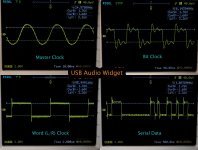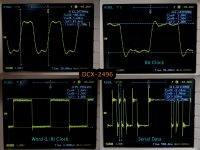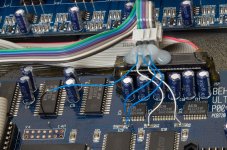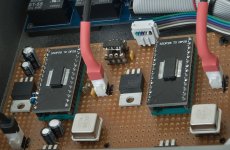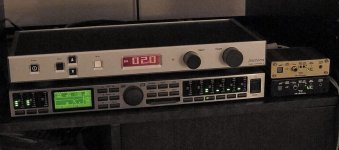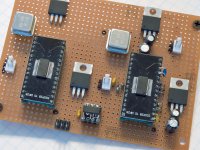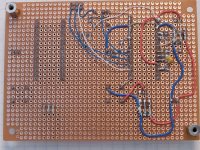progress on adding my spdif-out board.
I removed one of the input XLR's to make room for a pair of rca's. those will be 4 channels worth; I will not do 6 channels as its too much work and I only really need 4
the i2s wires are in place and strain-relieved by some hot-melt glue and a 2x3 header. a ribbon and IDC connector will go from there to the actual transmitter board.
had to stop there as this was all I could get done today. I put things back together and the unit still functions, so at least no harm done yet
tomorrow I'll do the perf board and actually wire it up.
I removed one of the input XLR's to make room for a pair of rca's. those will be 4 channels worth; I will not do 6 channels as its too much work and I only really need 4
the i2s wires are in place and strain-relieved by some hot-melt glue and a 2x3 header. a ribbon and IDC connector will go from there to the actual transmitter board.
had to stop there as this was all I could get done today. I put things back together and the unit still functions, so at least no harm done yet
tomorrow I'll do the perf board and actually wire it up.
Attachments
getting closer...
perf board mounted to chassis (I hate drilling but it had to be done) with stand-offs. its in securely, now. easy to remove for service, too.
i2s cable is made (I love IDC cables. its a joy to make these.)
spdif-out cables were some junk 75ohm composite tv wiring from 'yellow to yellow' patch cords. nothing high grade but better than bare wire, to be sure.
left to be done: find a clean enough 5v and ground tap and then do some testing.
perf board mounted to chassis (I hate drilling but it had to be done) with stand-offs. its in securely, now. easy to remove for service, too.
i2s cable is made (I love IDC cables. its a joy to make these.)
spdif-out cables were some junk 75ohm composite tv wiring from 'yellow to yellow' patch cords. nothing high grade but better than bare wire, to be sure.
left to be done: find a clean enough 5v and ground tap and then do some testing.
Attachments
partial success (the perf board does work) but its not working with the behringer yet.
I've verified the wolfson perf board by connecting its i2s to the usb audio widget, where I have the 4 i2s lines ready and easy to tap into. things work fine there, with this new board.
but when installed in the behringer, I'm not getting audio data out of the spdif transmitter. I see spdif lock-on via my dac led but only white noise comes out.
lr-clock is seen at 96khz via my scope and counter, so I know I have that line right. I'm not so sure that the master clock is clean enough to be dragged across inches of wire, though. that might be what's stopping this from working. any comments or ideas?
I've verified the wolfson perf board by connecting its i2s to the usb audio widget, where I have the 4 i2s lines ready and easy to tap into. things work fine there, with this new board.
but when installed in the behringer, I'm not getting audio data out of the spdif transmitter. I see spdif lock-on via my dac led but only white noise comes out.
lr-clock is seen at 96khz via my scope and counter, so I know I have that line right. I'm not so sure that the master clock is clean enough to be dragged across inches of wire, though. that might be what's stopping this from working. any comments or ideas?
Have you checked the SDIN, SDOUT, CSB and GPO0 status flags, these should indicate any errors in hardware mode (which seems to be quite complex to set):
http://www.wolfsonmicro.com/documents/uploads/data_sheets/en/WM8805.pdf
Search "Table 17".
http://www.wolfsonmicro.com/documents/uploads/data_sheets/en/WM8805.pdf
Search "Table 17".
I have more info (and some scope pics to upload of the waveforms, later on).
short summary: I compared a known good working config for the wolfson (96k audio file played over the 'usb audio widget') to the lines on the behringer (which is always 96k, at the output). result: the audio widget puts out 24mhz (and some fraction; the right number) but the behringer puts out 12.something (which is exactly half of what the wolfson needs).
I think the hardware mode (that I am running wolfson at) only wants to see the higher master clock freq, not a lower one. 12.something is too low and it wants 24.something. I know that 24.something works when I connect my new perf board setup to the audio widget and steal its i2s lines. music plays perfectly and glitch-free (I ran this mode for a few hours today to verify my wm8805 perf board build). and so, I know my build is ok and the hardware config of the 8805 is ok. the audio widget works with it and my dacs decode the spdif-out just fine.
the voltage levels even look more or less ok for i2s. and all the lines seem to be 'right' in that wordclock is 96k and bitclock is a few mhz and a constant wave and data is about bitclock speed but variable wave. master clock is the fastest but only 12.something.
so, this won't work just by hooking things up, as-is. at least not with this spdif transmitter chip.
I might look into doubling the 12.something and feeding that to the wolfsons. or I could look into another spdif transmitter chip, but that seems a bit drastic to me.
short summary: I compared a known good working config for the wolfson (96k audio file played over the 'usb audio widget') to the lines on the behringer (which is always 96k, at the output). result: the audio widget puts out 24mhz (and some fraction; the right number) but the behringer puts out 12.something (which is exactly half of what the wolfson needs).
I think the hardware mode (that I am running wolfson at) only wants to see the higher master clock freq, not a lower one. 12.something is too low and it wants 24.something. I know that 24.something works when I connect my new perf board setup to the audio widget and steal its i2s lines. music plays perfectly and glitch-free (I ran this mode for a few hours today to verify my wm8805 perf board build). and so, I know my build is ok and the hardware config of the 8805 is ok. the audio widget works with it and my dacs decode the spdif-out just fine.
the voltage levels even look more or less ok for i2s. and all the lines seem to be 'right' in that wordclock is 96k and bitclock is a few mhz and a constant wave and data is about bitclock speed but variable wave. master clock is the fastest but only 12.something.
so, this won't work just by hooking things up, as-is. at least not with this spdif transmitter chip.
I might look into doubling the 12.something and feeding that to the wolfsons. or I could look into another spdif transmitter chip, but that seems a bit drastic to me.
both devices shown with rigol scope captures.
the data and bit and wordclocks all look right! ignoring probing sloppiness and actual shape quality, for now.
the only thing that is 'wrong' is the master clock. its half of what the wolfson wants in order to work, at least in pure hardware mode for the 8805 chip.
the data and bit and wordclocks all look right! ignoring probing sloppiness and actual shape quality, for now.
the only thing that is 'wrong' is the master clock. its half of what the wolfson wants in order to work, at least in pure hardware mode for the 8805 chip.
Attachments
looking further at the wm8805 datasheet, in hardware mode (what I'm using, since its controller-less) the mclk MUST be 256 * Fs. fs = 96000 and so that's 24mhz roughly that the master clock has to be in. this fully explains why things 'didnt work' direct from the behringer. the dcx puts out 128Fs and not 256Fs on ITS master clock. bingo. akm chips work that way but the wolfson does not (again, in hw-mode).
so, I either have to find somewhere on the dcx that is already 256Fs or I have to clock-double to make use of this wolfson chip. or try another spdif transmitter chip.
so, I either have to find somewhere on the dcx that is already 256Fs or I have to clock-double to make use of this wolfson chip. or try another spdif transmitter chip.
some good news. I tried a spare cs8406 chip I had and it did work! at 128*Fs, you can jumper THAT chip in hardware mode to run. the wolfson, well, not so much.
I guess that's that, unless I feel like doing software controller stuff for the wolfson. (not right now, I don't!)
so, save yourself hassle and use my results. the wolfson is not right for this particular task. not unless you want to clock-double the 12 into a 24 for the 8805 to run at.
I guess that's that, unless I feel like doing software controller stuff for the wolfson. (not right now, I don't!)
so, save yourself hassle and use my results. the wolfson is not right for this particular task. not unless you want to clock-double the 12 into a 24 for the 8805 to run at.
some good news. I tried a spare cs8406 chip I had and it did work! at 128*Fs, you can jumper THAT chip in hardware mode to run. the wolfson, well, not so much.
I guess that's that, unless I feel like doing software controller stuff for the wolfson. (not right now, I don't!)
so, save yourself hassle and use my results. the wolfson is not right for this particular task. not unless you want to clock-double the 12 into a 24 for the 8805 to run at.
Linuxworks, congrats on your results. I love your spirit and the fact that nothing could stop you. Now that I am thinking somewhere in this thread I believe, there was a guy who was trying to achieve the same thing. Unfortunately I have no chance of finding it, but it was many years ago and many pages back in this thread. He was successful as well, picking up the signals and transmitting them further.
I have more partial good news. a friend gave me an AKM demo board (4103a) and that gives partial success with temporary i2s wiring. it does have a hw-mode that takes 128x rate, like the cirrus does. and for a few seconds, I was able to hear audio come out of the demo board while connected to the behringer. so, that chip has a chance of working, too.
maybe the i2s is just very weak and having 3 dac chips on the bus is strain enough and I'm pushing it over the limit. on both the cirrus and the akm, the sound dropped out a lot. I did use very very bad wiring, but I also abused the wiring on the audio widget and that thing is almost unsinkable it just always works, even with junky and long 'wrong' cables on the i2s lines. it does have a pretty strong and clean master clock and the behringer has a pretty weak looking one. the data lines are all private per dac chip but all the clock lines are shared.
it just always works, even with junky and long 'wrong' cables on the i2s lines. it does have a pretty strong and clean master clock and the behringer has a pretty weak looking one. the data lines are all private per dac chip but all the clock lines are shared.
some buffering might be worth looking into.
maybe the i2s is just very weak and having 3 dac chips on the bus is strain enough and I'm pushing it over the limit. on both the cirrus and the akm, the sound dropped out a lot. I did use very very bad wiring, but I also abused the wiring on the audio widget and that thing is almost unsinkable
some buffering might be worth looking into.
Have you checked the SDIN, SDOUT, CSB and GPO0 status flags, these should indicate any errors in hardware mode (which seems to be quite complex to set):
http://www.wolfsonmicro.com/documents/uploads/data_sheets/en/WM8805.pdf
Search "Table 17".
I have not looked at any status lines. in fact, I first had all lines tied up or gnded. then I thought gnding might be harsh for a line that could report status, even if I don't read it. so I pulled down with 1k's. I'm still not looking at the lines, though.
with spdif-in, I could see checking for errors. but I didn't think to check for error lights when you are taking in i2s and putting out spdif.
anyway, the more I look at the 8805 spec sheet, the more I think that hw-mode just can ONLY support 256x fs. and that is just NOT what is inside the dcx2496. leds or no leds, I don't think this dog is gonna hunt.
Actually there is a 24.576 MHz oscillator inside DCX2496. You might want to upgrade to Oettle's ASRC+clock module and use the 24.576 MHz clock supplied by it (might be good idea to use a proper shielded cable, if possible mount your S/PDIF transmitter closer the clock source):
Pilgham Audio - SRC/Clock
There is also another design (guess the best one, though ideally it would need an extra buffered BNC connector for your S/PDIF transmitter) here based to TI's ASRC (includes MSP430 micro) :
http://koti.mbnet.fi/jahonen/Audio/DIY/DCX2496DinSRC/
Third one which uses CS8416 SOIC part which is difficult to find these days.:
http://freerider.dyndns.org/anlage/Behringer-Input-Stage-E.htm
Pilgham Audio - SRC/Clock
There is also another design (guess the best one, though ideally it would need an extra buffered BNC connector for your S/PDIF transmitter) here based to TI's ASRC (includes MSP430 micro) :
http://koti.mbnet.fi/jahonen/Audio/DIY/DCX2496DinSRC/
Third one which uses CS8416 SOIC part which is difficult to find these days.:
http://freerider.dyndns.org/anlage/Behringer-Input-Stage-E.htm
Last edited:
Actually there is a 24.576 MHz oscillator inside DCX2496.
do you have a handy tap location for this clock? I'm willing to try it.
update: I see clk12 and I guess that's the 12mhz clock that is there on master clock for the dacs. but I also see clk24! that must be what you are referring to? ic20b which is a 74hcu04 - that is doing some clock doubling already for me, it seems.
I'll see if I can find it and tap into it, IF that's the right one. thanks
Last edited:
SUCCESS!
yes, the 24.576 line is truly 24.576. just what the doctor ordered
photos of where the new tap location is for the master clock and also a level matching chip on my perf board (dip8 socket with 'flying soic' cmos schmitt trigger, running on 3.3v and outputing 3.3v but accepting the 5v level 24mhz clock input).
with all this in place, the wolfsons are now putting out spdif to my outboard dacs!
I am noticing some drop-outs every now and then, so the wiring probably still needs cleaning up. I might try skipping the ribbon and handling each line by itself via small coax (rg174 or equiv) runs.
but the basic idea IS now working!
yes, the 24.576 line is truly 24.576. just what the doctor ordered
photos of where the new tap location is for the master clock and also a level matching chip on my perf board (dip8 socket with 'flying soic' cmos schmitt trigger, running on 3.3v and outputing 3.3v but accepting the 5v level 24mhz clock input).
with all this in place, the wolfsons are now putting out spdif to my outboard dacs!
I am noticing some drop-outs every now and then, so the wiring probably still needs cleaning up. I might try skipping the ribbon and handling each line by itself via small coax (rg174 or equiv) runs.
but the basic idea IS now working!
Attachments
Last edited:
update: the wiring seems fine, I think. my home AC power line is glitchy and when I turn off my heating system, entirely, there are no more mutes happening every few minutes. one thing I did notice about the dcx2496, overall, is that its very sensitive to rfi and bad power. if I turn on a fluorescent light or a kitchen ceiling fixture light, the dcx chokes and chokes for several seconds before it recovers. always been that way, too, even before I got my hands on its insides 
and so, when I work around my bad AC power (turning off the heating system, manually), the wiring or circuit can't be blamed anymore. I'm not hearing any muting or interruptions or bad samples or anything out of place when I listen to it.
for test, I've disabled the 24db/oct crossover slope I normally use and just run the channel in fullrange mode. then into a regular dac and regular amp and spkrs.
at some point, I'd like to capture the spdif-out using a digital sound card, then compare the files and see if anything gets dropped, over an hour or more. for right now, though, I'm listening to some quiet piano and if there are drop-outs or glitches, I'll hear it. and I'm not hearing any, with my AC power problems solved, at least.
I was about to shift over to the cirrus parts but it looks like I can use the board that I built afterall. yay!!
and so, when I work around my bad AC power (turning off the heating system, manually), the wiring or circuit can't be blamed anymore. I'm not hearing any muting or interruptions or bad samples or anything out of place when I listen to it.
for test, I've disabled the 24db/oct crossover slope I normally use and just run the channel in fullrange mode. then into a regular dac and regular amp and spkrs.
at some point, I'd like to capture the spdif-out using a digital sound card, then compare the files and see if anything gets dropped, over an hour or more. for right now, though, I'm listening to some quiet piano and if there are drop-outs or glitches, I'll hear it. and I'm not hearing any, with my AC power problems solved, at least.
I was about to shift over to the cirrus parts but it looks like I can use the board that I built afterall. yay!!
here's my system, together, with two DACs handling the HP/LP split.
notice that the two small DACs on the right have both of their status LEDs green. they are truly getting 24/96 audio from the output of the behringer!
from the 2 DACs, its as it was before, going into my cirrus 8ch vol control system and then out to a pair of stereo amps.
its playing now
notice that the two small DACs on the right have both of their status LEDs green. they are truly getting 24/96 audio from the output of the behringer!
from the 2 DACs, its as it was before, going into my cirrus 8ch vol control system and then out to a pair of stereo amps.
its playing now
Attachments
photos of the working board (half wired).
being only half wired (one transmitter, only) makes the wiring a bit easier to follow, for those that may want to.
after I took this photo, I finished the board up and its now working with all 4 channels active.
the wiring was not really that bad. of course, a green board would be better...
being only half wired (one transmitter, only) makes the wiring a bit easier to follow, for those that may want to.
after I took this photo, I finished the board up and its now working with all 4 channels active.
the wiring was not really that bad. of course, a green board would be better...
Attachments
- Home
- Source & Line
- Digital Line Level
- Behringer DCX2496 digital X-over
